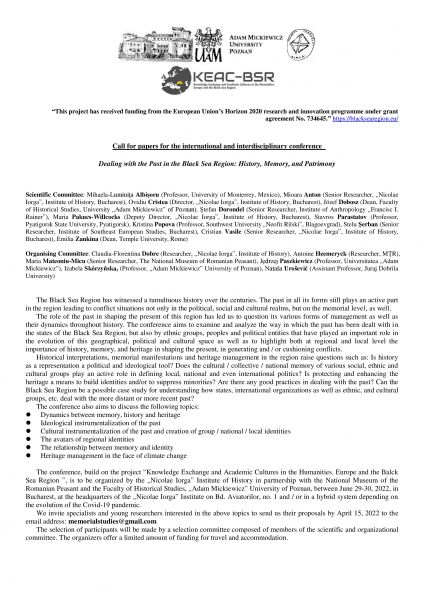“This project has received funding from the European Union’s Horizon 2020 research and innovation programme under grant agreement No. 734645.” https://blacksearegion.eu/
Call for papers for the international and interdisciplinary conference
Dealing with the Past in the Black Sea Region: History, Memory, and Patrimony
Scientific Committee: Mihaela-Luminița Albișoru (Professor, University of Monterrey, Mexico), Mioara Anton (Senior Researcher, „Nicolae Iorga”, Institute of History, Bucharest), Ovidiu Cristea (Director, „Nicolae Iorga”, Institute of History, Bucharest), Józef Dobosz (Dean, Faculty of Historical Studies, University „Adam Mickiewicz” of Poznan), Ștefan Dorondel (Senior Researcher, Institute of Anthropology „Francisc I. Rainer”), Maria Pakucs-Willcocks (Deputy Director, „Nicolae Iorga”, Institute of History, Bucharest), Stavros Parastatov (Professor, Pyatigorsk State University, Pyatigorsk), Kristina Popova (Professor, Southwest University „Neofit Rilski”, Blagoevgrad), Stelu Șerban (Senior Researcher, Institute of Southeast European Studies, Bucharest), Cristian Vasile (Senior Researcher, „Nicolae Iorga”, Institute of History, Bucharest), Emilia Zankina (Dean, Temple University, Rome)
Organising Committee: Claudia-Florentina Dobre (Researcher, „Nicolae Iorga”, Institute of History), Antoine Heemeryck (Researcher, MȚR), Maria Mateoniu-Micu (Senior Researcher, The National Museum of Romanian Peasant), Jędrzej Paszkiewicz (Professor, Universitatea „Adam Mickiewicz”), Izabela Skórzyńska, (Professor, „Adam Mickiewicz” University of Poznan), Nataša Urošević (Assistant Professor, Juraj Dobrila University)
The Black Sea Region has witnessed a tumultuous history over the centuries and has to deal with a conflicting memory between states as well as within these very states, while attempting to preserve and enhance its transnational heritage. The past in all its forms still plays an active part in the region leading to conflict situations not only in the political, social and cultural realms, but on the memorial level, as well.
The role of the past in shaping the present of this region has led us to question its various forms of management as well as their dynamics throughout history. The conference aims to examine and analyze the way in which the past has been dealt with in the states of the Black Sea Region, but also by ethnic groups, peoples and political entities that have played an important role in the evolution of this geographical, political and cultural space as well as to highlight both at regional and local level the importance of history, memory, and heritage in shaping the present, in generating and / or cushioning conflicts.
Historical interpretations, memorial manifestations and heritage management in the region can provide us with a series of answers to questions such as: Is history as a representation a political and ideological tool? Does the cultural / collective / national memory of various social, ethnic and cultural groups play an active role in defining local, national and even international politics? Is protecting and enhancing the heritage a means to build identities and/or to suppress minorities? Are there any good practices in dealing with the past? Can the Black Sea Region be a possible case study for understanding how states, international organizations as well as ethnic, and cultural groups, etc. deal with the more distant or more recent past?
The conference also aims to discuss the following topics:
- Dynamics between memory, history and heritage
- Ideological instrumentalization of the past
- Cultural instrumentalization of the past and creation of group / national / local identities
- The avatars of regional identities
- The relationship between memory and identity
- Heritage management in the face of climate change
The conference, build on the project “Knowledge Exchange and Academic Cultures in the Humanities. Europe and the Balck Sea Region ”, is to be organized by the „Nicolae Iorga” Institute of History in partnership with the National Museum of the Romanian Peasant and the Faculty of Historical Studies at „Adam Mickiewicz” University of Poznan between June 29-30, 2022, in Bucharest, at the headquarters of the „Nicolae Iorga” Institute on Bd. Aviatorilor, no. 1 and / or in a hybrid system depending on the evolution of the Covid-19 pandemic.
We invite specialists and young researchers interested in the above topics to send us their proposals by April 15, 2022 to the email address: memorialstudies@gmail.com
The selection of participants will be made by a selection committee composed of members of the scientific and organizational committee. The organizers offer a limited amount of funding for travel and accommodation.


